| Srl | Item |
| 1 |
ID:
175923
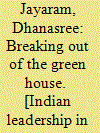

|
|
|
|
|
| Publication |
New Delhi, KW Publishers Pvt Ltd and CAPS, 2012.
|
| Description |
xxii, 235p.Hbk
|
| Standard Number |
9789381904138
|
|
|
|
|
|
|
|
|
|
|
|
Copies: C:1/I:0,R:0,Q:0
Circulation
| Accession# | Call# | Current Location | Status | Policy | Location |
| 059934 | 363.73874/JAY 059934 | Main | On Shelf | General | |
|
|
|
|
| 2 |
ID:
118870
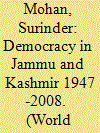

|
|
|
| 3 |
ID:
132413
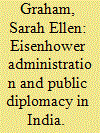

|
|
|
|
|
| Publication |
2014.
|
| Summary/Abstract |
The United States-India relationship was fraught with misapprehension and ideological disagreement during the 1950s. Public diplomacy provides a valuable context for examining these dynamics. This analysis assesses the planning, deployment, and reception of American public diplomacy to India under President Dwight Eisenhower, a period encompassing Washington's 1954 alliance with Pakistan and economic aid to India in 1957-1958. Public diplomacy reflects the Administration's difficulty in clarifying its interests in India. The rhetorical and moralising approach of India's leadership, and their prominence in the global non-aligned movement, contributed greatly to this ambivalence. Public diplomacy planning highlights Washington's difficulties in confronting India's identity in world politics; it struggled to craft messages on racial attitudes, consumerism, and Communism, whilst Soviet public diplomacy gave strong competition throughout the period. At the same time, several aspects of American public diplomacy resonated with Indian audiences, indicating that there was the possibility of a closer American relationship with India had Washington taken a different high policy approach to the region.
|
|
|
|
|
|
|
|
|
|
|
|
|
|
|
|
| 4 |
ID:
090323
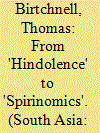

|
|
|
|
|
| Publication |
2009.
|
| Summary/Abstract |
A resurgence in Hindu nationalism in India is accompanying a burgeoning interest in Indian spiritual values in global aspirational and management literature. This article traces the shift in understandings of the economic valency of Indian spiritual values outlining the popular relation of Hindu values to economic growth and management and leadership discourse and practice.
|
|
|
|
|
|
|
|
|
|
|
|
|
|
|
|
| 5 |
ID:
141502
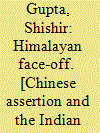

|
|
|
|
|
| Publication |
Gurgaon, Hachette Book Publishing India Pvt. Ltd, 2015.
|
| Description |
xiv, 328p.pbk
|
| Standard Number |
9789350099896
|
|
|
|
|
|
|
|
|
|
|
|
Copies: C:1/I:0,R:0,Q:0
Circulation
| Accession# | Call# | Current Location | Status | Policy | Location |
| 058350 | 327.51054/GUP 058350 | Main | On Shelf | General | |
|
|
|
|
| 6 |
ID:
132131
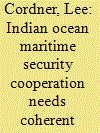

|
|
|
|
|
| Publication |
2014.
|
| Summary/Abstract |
Maritime security in the Indian Ocean Region (IOR) is a central issue for regional and extra-regional actors. Traditional and non-traditional security challenges largely converge at sea as they impact economic, environmental, energy, human, food and national security. As the major regional power and an emerging Asian great power, India's willingness and capacity to provide strategic leadership is critical to engendering a cooperative spirit of shared destiny. India's growing naval capabilities indicate a strong commitment to maritime security. However, its strategic policy ambiguity and lack of transparency undermines trust and confidence. Allegations of civil-military dissonance and the lack of political will for reform raises questions about strategic competence. India's willingness and capacity for cooperative regional security leadership presents regional risks. The new Indian government is presented with significant challenges to reform domestic politico-bureaucratic-military arrangements in order to enhance external and internal consistency and credibility, and improve openness and coherency.
|
|
|
|
|
|
|
|
|
|
|
|
|
|
|
|
| 7 |
ID:
170897
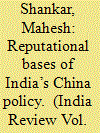

|
|
|
|
|
| Summary/Abstract |
This paper analyzes instances of the Indian leadership’s choice of an escalatory approach in its border dispute with China, first in the adoption of the Forward Policy in the lead up to the 1962 war, and more briefly the more recent decision in 2017 to take escalatory action in response to Chinese activity in the Doklam area in the trijunction of the India-China-Bhutan border region. In doing so, the paper demonstrates how a focus on reputation as an explanatory factor may allow us to make better sense of how Indian leaders have in the past and continue to in the present make decisions on key issues of national security concern.
|
|
|
|
|
|
|
|
|
|
|
|
|
|
|
|